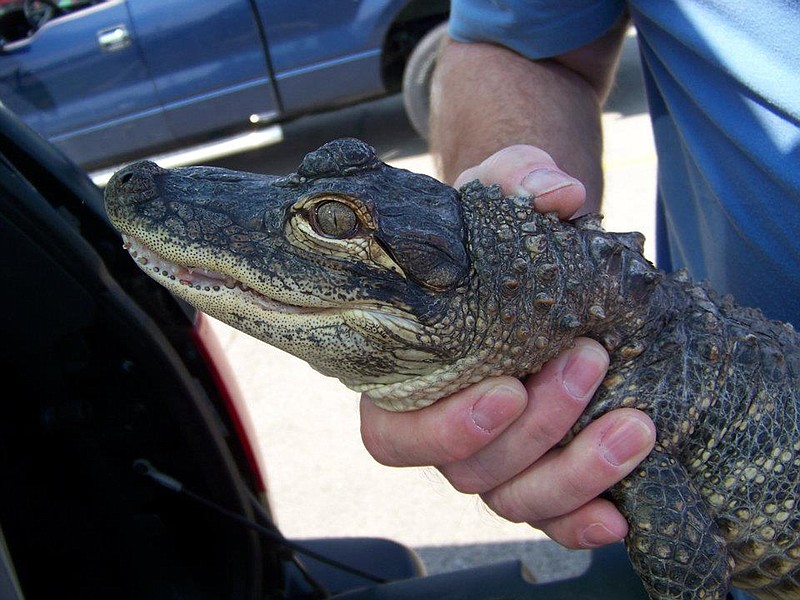The 50 baby alligators were cute little critters, each roughly the size of a pencil, when a Colorado man sold them out of a trailer in the parking lot of the Kennett Eagles Club in southeast Missouri.
Fourteen months later, Kennett authorities are worried about what's become of those animals.
"Now they've grown and they're not cute anymore," Humane Department officer Tina Petix said. "They're trying to bite people."
So Petix is on a gator hunt, hoping to convince any owners that small-town Missouri life is neither good for the reptile nor the people and pets it may encounter.
So far, three alligators have been located and removed. One woman was keeping two as pets, often in a backyard next to a home where 3-year-old twins live. The other nearly snapped off its owner's hand.
Petix has no idea how many gators Ken Henderson sold in January and February 2011, when he set up a makeshift shop and sold exotic creatures out of his trailer.
A nearly catastrophic fire in February 2011 ended his stay. Police believe one of the animals kicked over a heat lamp, setting the trailer ablaze. Henderson and rescuers scurried to save the creatures, including iguanas, alligators and a 13-foot python.
"It was like Noah's Ark," Petix recalled.
Henderson was treated for burns and some of the animals were injured and turned over to animal rescue groups.
But the extended fallout from the sale of the alligators is less certain. Petix also doesn't know how many survived or are even still in Kennett, a town with laws governing exotic pets, including a ban on alligators.
American alligators are native to Florida, Louisiana and other southern states, and the closest they come to Missouri in the wild is Arkansas. Winters are simply too cold, said Jeff Ettling, curator of herpetology and aquatics at the St. Louis Zoo.
Experts say alligators also are not suited to be pets, in part because they're expensive to feed. Baby gators eat crickets and other bugs, but a 1-year-old gator needs several pounds of meat each day.
And, of course, there's the inherent danger - alligators will eat fish and snakes, but also pets or "anything they can swallow," Ettling said, and gators often have a nasty attitude.
"As they grow in size, their disposition changes," Ettling said. "Like a lion cub as it gets big, it's got wild instincts."
Petix's alligator amnesty yielded immediate results last week when a woman brought in a 34-inch gator that her father had purchased from Henderson for her teenage son.
"He thought it would be a cute pet," Petix said. "When she went to feed it the last couple of times, it jumped and just about bit her arm. That's when she said, 'We can't do this anymore.' "
The alligator was turned over to volunteers with the St. Louis Herpetological Society. It wasn't clear what happened to the animal after that, and the society didn't return phone messages.
Two children, one in elementary school, lived in the home with the woman who owned two alligators, Petix said. She kept them inside most of the time, but did allow them in the backyard. In addition to the toddler twins next door, other children live in the neighborhood.
The woman had been known to take the gators - now roughly 3 feet long - for walks on leashes.
After repeated conversations with Petix, the woman gave up the alligators, though she refused to tell city officials what she did with them. Petix declined to identify the owners.
Henderson, in his late 60s, travels parts of the country showing and selling exotic animals. He had stopped in Kennett before, in 2009, and earned the nickname "The Alligator Man." Henderson did not respond to interview requests.
He doesn't face charges in Kennett related to selling gators, though police quickly told him to move on after the fire.
But Henderson was arrested last summer in Columbia, Mo., after bringing his animals to a fair. He is scheduled to stand trial there on seven misdemeanor counts of keeping a dangerous wild animal without registering with police next month.
Henderson's attorney, Kevin O'Brien, said it is wrong to blame Henderson for selling alligators, noting that they are readily available at pet stores.
Petix said she may never know if all of the alligators will be turned in, but she'll be glad when her job returns to normal.
"I'm used to dealing with cats and dogs, not alligators," she said.

